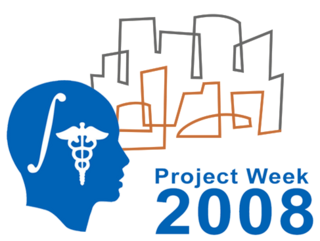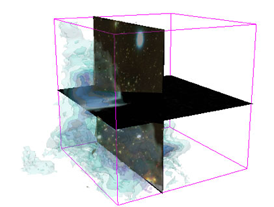Difference between revisions of "NA-MIC/Projects/Non-Medical Collaborations/Astronomical Medicine"
(New page: {| |thumb|320px|Return to [[2008_Summer_Project_Week|Project Week Main Page ]] |[[Image:Future-astromed-slicer-mockup.png|thumb|320px|Mockup of a future vers...) |
|||
| Line 24: | Line 24: | ||
Our approach is summarized on the [http://astromed.iic.harvard.edu Astronomical Medicine web site]. The main challenge to this approach at the moment, is the impedance mismatch between celestial coordinates and medical imaging coordinates, and a lack of infrastructure within ITK and Slicer to allow for alternative coordinate systems. | Our approach is summarized on the [http://astromed.iic.harvard.edu Astronomical Medicine web site]. The main challenge to this approach at the moment, is the impedance mismatch between celestial coordinates and medical imaging coordinates, and a lack of infrastructure within ITK and Slicer to allow for alternative coordinate systems. | ||
| − | Our plan for the project week is to | + | Our plan for the project week is to see if we can add support for World Coordinate System grid images to Slicer3 in order to allow astronomical coordinate readout from slice planes. |
</div> | </div> | ||
| Line 30: | Line 30: | ||
<h1>Progress</h1> | <h1>Progress</h1> | ||
| − | + | We have implemented software that has allowed Slicer to be used as a platform for doing cutting-edge radio astronomy. Peer-reviewed publications are pending, including one in <i>Nature</i>. | |
| − | |||
| − | |||
| − | |||
| − | |||
| − | |||
| − | |||
| − | |||
| − | |||
| − | |||
| − | |||
| − | |||
| − | |||
| − | |||
| − | |||
| − | |||
| − | |||
| − | |||
| − | |||
| − | |||
| − | |||
| − | |||
</div><br style="clear: both;" /></div> | </div><br style="clear: both;" /></div> | ||
| Line 59: | Line 38: | ||
* The [http://am.iic.harvard.edu Astronomical Medicine web site] | * The [http://am.iic.harvard.edu Astronomical Medicine web site] | ||
* [http://am.iic.harvard.edu/FITS-reader Open-source release] of our ITK-based FITS file reader/converter. | * [http://am.iic.harvard.edu/FITS-reader Open-source release] of our ITK-based FITS file reader/converter. | ||
| + | * [http://astromed.iic.harvard.edu/DendroStar DendroStar] applet for visualization of dendrogram representations of spectral line data cubes. | ||
* Michelle Borkin, Alyssa Goodman, Michael Halle, Douglas Alan, Jens Kauffmann, [http://adsabs.harvard.edu/cgi-bin/nph-bib_query?bibcode=2006AAS...209.5706B&db_key=AST&data_type=HTML&format=&high=438a74bfef26079 "Application of Medical Imaging Software to the 3D Visualization of Astronomical Data"], 1/2007, 2007 AAS/AAPT Joint Meeting, American Astronomical Society Meeting 209, #57.06. Presentation: [http://www.cfa.harvard.edu/COMPLETE/astromed/aas209/057.06_borkin.ppt PPT] [http://www.cfa.harvard.edu/COMPLETE/astromed/aas209/057.06_borkin.pdf PDF]. | * Michelle Borkin, Alyssa Goodman, Michael Halle, Douglas Alan, Jens Kauffmann, [http://adsabs.harvard.edu/cgi-bin/nph-bib_query?bibcode=2006AAS...209.5706B&db_key=AST&data_type=HTML&format=&high=438a74bfef26079 "Application of Medical Imaging Software to the 3D Visualization of Astronomical Data"], 1/2007, 2007 AAS/AAPT Joint Meeting, American Astronomical Society Meeting 209, #57.06. Presentation: [http://www.cfa.harvard.edu/COMPLETE/astromed/aas209/057.06_borkin.ppt PPT] [http://www.cfa.harvard.edu/COMPLETE/astromed/aas209/057.06_borkin.pdf PDF]. | ||
Revision as of 23:04, 5 June 2008
Home < NA-MIC < Projects < Non-Medical Collaborations < Astronomical Medicine Return to Project Week Main Page |
Key Investigators
- Havard IIC: Douglas Alan
- BWH/Harvard IIC: Mike Halle
Objective
We are developing tools and enhancements to ITK and Slicer in order to adapt Slicer to be a tool that is useful for the visualization of astronomical data, specifically spectral line data cubes for now.
Approach, Plan
Our approach is summarized on the Astronomical Medicine web site. The main challenge to this approach at the moment, is the impedance mismatch between celestial coordinates and medical imaging coordinates, and a lack of infrastructure within ITK and Slicer to allow for alternative coordinate systems.
Our plan for the project week is to see if we can add support for World Coordinate System grid images to Slicer3 in order to allow astronomical coordinate readout from slice planes.
Progress
We have implemented software that has allowed Slicer to be used as a platform for doing cutting-edge radio astronomy. Peer-reviewed publications are pending, including one in Nature.
References
- The Astronomical Medicine web site
- Open-source release of our ITK-based FITS file reader/converter.
- DendroStar applet for visualization of dendrogram representations of spectral line data cubes.
- Michelle Borkin, Alyssa Goodman, Michael Halle, Douglas Alan, Jens Kauffmann, "Application of Medical Imaging Software to the 3D Visualization of Astronomical Data", 1/2007, 2007 AAS/AAPT Joint Meeting, American Astronomical Society Meeting 209, #57.06. Presentation: PPT PDF.
- Michelle Borkin, Alyssa Goodman, Michael Halle, Douglas Alan, "Application of Medical Imaging Software to 3D Visualization of Astronomical Data", 10/2006, ADASS XVI Conference. Presentation: PPT PDF (linked movies).
- Michelle A. Borkin, "A COMPLETE Survey of Velocity Features in Perseus", 5/2006, Harvard University Undergraduate Senior Thesis.
- Michelle A. Borkin, Naomi A. Ridge, Alyssa A. Goodman, Michael Halle, "Demonstration of the Applicability of "3D Slicer" to Astronomical Data using 13CO and C18O Observations of IC348", 5/2005, astro-ph/0506604.
